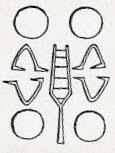10:10:08
Memorial Service
Spring Hill Cemetery
Lynchburg, Virginia
Michael Ross McConnell
b. Thursday 10 July 1952
d. Orthodox Easter Sunday 27 April 2008
Memorial Service
Spring Hill Cemetery
Lynchburg, Virginia
Michael Ross McConnell
b. Thursday 10 July 1952
d. Orthodox Easter Sunday 27 April 2008
I had to be in Chicago on 10:10:08 or I would have attended the Memorial Service. One last Ross adventure. A chance to meet his parents and members of the Ross community.
At the Service his Father circulated a document which MJ described as a screed.
At the Service his Father circulated a document which MJ described as a screed.
“Screed” has distinctly negative connotations compared to “manifesto,” which is a more neutral term for a public declaration explaining the intentions behind a course of action (derived via Italian from the Latin verb “manifestare,” meaning “to make public”).
“Screed,” now used for a long, vehement denunciation in speech or writing, has had a number of semantic twists and turns in its history. When it first showed up in English sources in the 14th century, its meaning was quite different. It referred to a fragment or scrap, particularly a cut piece of paper, leather or fabric. The word apparently originated as a variant form of “shred” appearing in some local dialects of England.
‘Screed’ also had an independent meaning: A harsh, screeching noise, as from a poorly played fiddle or bagpipe.
“Screed” developed other regional meanings, such as a narrow parcel of land, a bordering strip or the frilled edge of a woman’s cap. Charlotte Brontë, in her 1848 novel “Shirley,” describes a “screed, or frill of the cap” which “stood a quarter of a yard broad round the face of the wearer.” Builders took “screed” in a more technical direction, to refer to a strip of plaster or wood used as a guide for accurate finishing.
In Scottish usage, “screed” took on yet another meaning: a long, tiresome list or a tedious bit of speech or writing. In a comic play from 1748 titled “The Double Traitor Roasted: A New Scots Opera,” one character lampoons the other’s flowery speech: “A Scots writer, by the Lord, for they cannot speak without a screed of Latin.”
As the use of “screed” for lengthy discourse became entrenched in the English lexicon, it accrued harsher tones, likely influenced by similar-sounding words like “scream” and “screech.” It likely helped that “screed” at the time also had an independent meaning in Scottish and Irish English for a harsh, screeching noise, as from a poorly played fiddle or bagpipe. In current usage, a “screed” isn’t simply tedious but suggests a bile-filled rant.









